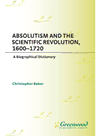
Absolutism and the Scientific Revolution, 1600-1720. A Biographical Dictionary PDF
Preview Absolutism and the Scientific Revolution, 1600-1720. A Biographical Dictionary
Absolutism and the Scientific Revolution, 1600-1720 Recent Titles in The Great Cultural Eras of the Western World Renaissance and Reformation, 1500-1620: A Biographical Dictionary Jo Eldridge Carney, editor The Late Medieval Age of Crisis and Renewal, 1300-1500: A Biographical Dictionary Clayton J. Drees, editor From Polis to Empire—The Ancient World, c. 800 B.C.-A.D. 500: A Biographical Dictionary Andrew G. Traver, editor The Rise of the Medieval World, 500-1300: A Biographical Dictionary Jana K. Schulman, editor Absolutism and the Scientific Revolution, 1600-1720 A Biographical Dictionary Edited by CHRISTOPHER BAKER The Great Cultural Eras of the Western World Ronald H. Fritze, Series Adviser GREENWOOD PRESS Westport, Connecticut • London Library of Congress Cataloging-in-Publication Data Absolutism and the scientific revolution, 1600-1720: a biographical dictionary / edited by Christopher Baker. p. cm.—(The great cultural eras of the Western world, ISSN 1534-9527) Includes bibliographical references and index. ISBN 0-313-30827-6 (alk. paper) 1. Europe—History—17th century—Biography—Dictionaries. 2. Europe—History—18th century—Biography—Dictionaries. 3. Europe—Intellectual life—17th century—Biography— Dictionaries. 4. Europe—Intellectual life—18th century—Biography—Dictionaries. 5. Enlightenment—Europe—18th century—Biography—Dictionaries. 6. Authoritarianism— Europe—History—17th century. 7. Authoritarianism—Europe—History—18th century. I. Baker, Christopher. II. Series. D205.A27 2002 940.2'52—dc21 2002017109 British Library Cataloguing in Publication Data is available. Copyright © 2002 by Christopher Baker All rights reserved. No portion of this book may be reproduced, by any process or technique, without the express written consent of the publisher. Library of Congress Catalog Card Number: 2002017109 ISBN: 0-313-30827-6 ISSN: 1534-9527 First published in 2002 Greenwood Press, 88 Post Road West, Westport, CT 06881 An imprint of Greenwood Publishing Group, Inc. www.greenwood.com Printed in the United States of America The paper used in this book complies with the Permanent Paper Standard issued by the National Information Standards Organization (Z39.48-1984). 10 9 8 7 6 5 4 3 21 For Barbara and Matt This page intentionally left blank Contents Introduction ix Chronology xvii Absolutism and the Scientific Revolution, 1600-1720 1 Appendix A: Entries Arranged by Subject 413 Appendix B: Entries Arranged by Country 421 Bibliography 429 Index 439 About the Editor and Contributors 447 This page intentionally left blank Introduction Despite the truism that every age is an age of transition, the hindsight of history reveals certain eras to have been periods of radically decisive intellectual change. Such was the seventeenth century in Western Europe. By 1600, the momentum of the Renaissance, whether defined as the birth of a new spirit of creativity or as the slow death of medievalism, was peaking, and the current of religious reformation was in full tide, soon to make itself felt as well in the North Amer ican colonies. These and other aspects of the sixteenth century have led to a recent tendency to replace the term "Renaissance" with "Early Modern," a label that, while raising problematic issues of its own, nevertheless cautions against artificially rigid divisions in the flux of historical development. The boundaries of historical periods are necessarily permeable, and those of this volume are no different; yet it is fair to say that by 1720 the adjective "modern" no longer requires that we modify it with "early." One could perhaps point to 1642, the year of Galileo's death and Newton's birth, as the last chronological juncture between the "old world" and the "new," or possibly 1674, the year of poet John Milton's death, the last English literary voice of the Renaissance, as the point of transition from "early modern" to "modern." However, paraphrasing Virginia Woolf's only half facetious com ment upon seeing the 1901 London exhibition of Postimpressionist art, events in 1648 make it tempting to assert that in that year "human nature changed." It saw two occurrences that demonstrated a decisive alteration in the assumptions of Christian humanism and the Protestant reformation, which had marked the sixteenth century. The Treaty of Westphalia ended the Thirty Years' War; though it may have been a struggle that, in C.V. Wedgewood's phrase, "need not have happened and settled nothing worth settling," it was the last European conflict in which religious differences were believed important enough to go to battle over. Issues of politics, class, and national interest were key causes as well, but the conflict drew heavily upon the tensions between Calvinists and
